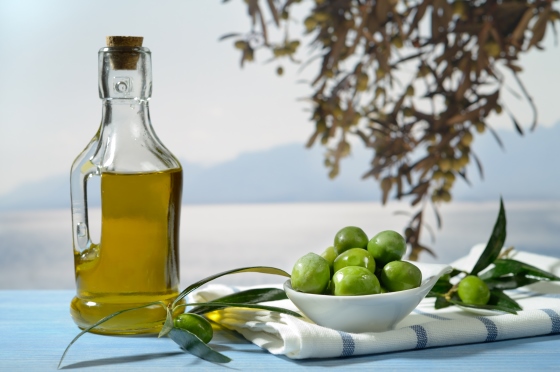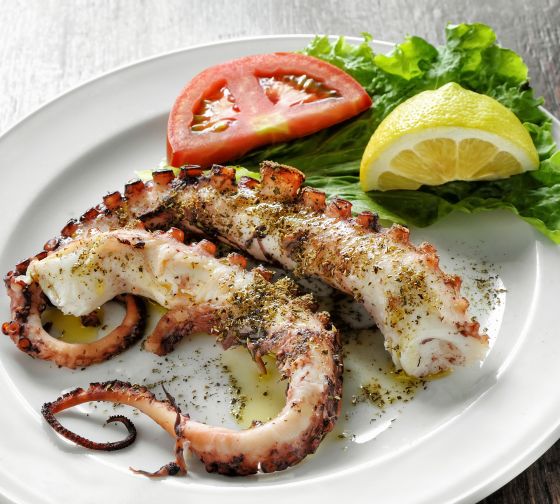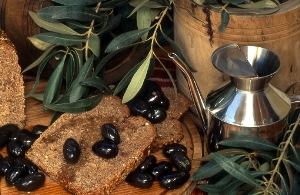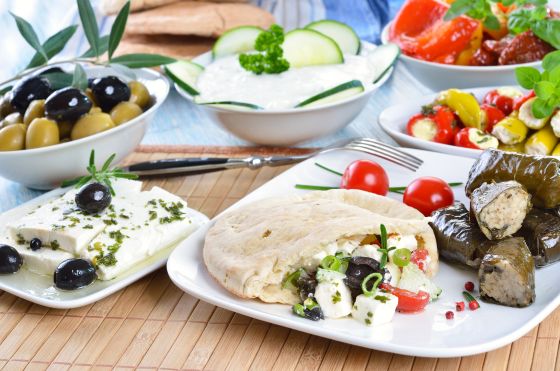Greek Cuisine!
One of the most authentic cultural elements of a place is gastronomy. The unique tastes of a destination’s cuisine are linked to the qualities and characteristics of its society and reveal an important piece of information regarding its cultural and economic history. At the same time, food is also a form of communication, a way to “speak” to someone’s heart.
Greek cuisine, rich in authentic flavours and aromas represents an age-old cultural unity. It has a history of around 4,000 years, with special characteristics based on pure and unique quality goods of the Greek land. In fact, it was Archestratos who wrote the first cookbook in history (330 B.C.).
Despite what you may believe about Greek cuisine, it is more than just “moussaka”, “souvlaki” and the famous Greek Salad “choriatiki”. It offers a great variety of delicious and healthy dishes that can fully satisfy everyone, both vegetarians and meat lovers. Dozens of scientific studies have shown the positive effect of a balanced Greek diet on a person’s health, beauty and longevity.
Basic ingredients
Greek cuisine has four secrets: good quality fresh ingredients, correct use of flavourings (herbs) and spices, the famous Greek olive oil and simplicity.
Greek olive oil deserves a special note. It accompanies almost all Greek dishes, it is used abundantly in most of them, it is of excellent quality and it is very good for your health. It is also known that artificial cultivation of vegetables is not carried out due to the mild Greek climate. Consequently, most vegetables are cultivated in natural ways and they therefore maintain their aroma and their flavour. You will be happy and content after tasting a Greek tomato, cabbage, carrot, onion, parsley and garlic. At the same time, you should not forget the rich flavour and aroma of fresh Greek fruits, such as grapes, apricots, peaches, cherries, melons, watermelons, etc.
As far as flavourings (herbs) are concerned, which almost every Greek gathers from the hills and the countryside, they are renowned for their gustativeness, aromas and curative properties. As you taste some of the many different dishes, you will be mesmerized by the amazing aroma of oregano, thyme, mint and rosemary. Do not forget to also try the Greek cheeses, especially feta cheese. Taking as fact that the sheep and goats are free-ranging and the pastures are especially lush and green, Greek meat has a unique taste that cannot be compared. Mediterranean seafood is much tastier than those from the oceans. The Aegean and Ionian Seas are crystal clear and rich with fish. Fresh fish on the grill is considered to be a true delight.
Greek philosophy
The time of the day when Greeks gather around the table to enjoy a meal or various hors d’oeuvres (mezedes) with ouzo is a tradition that every Greek maintains with reverence. A deeply entrenched social custom is when Greeks share a meal with friends at home, in a restaurant or a tavern. The Greek word “symposium” -a word that is as old as Greece itself- literally means “drinking with friends”.
The atmosphere in an ordinary Greek restaurant or tavern is relaxing, simple and informal. The preparation of the food on the other hand has its own sacred rules. Good amateur cooks are highly respected in their social circle, while a good housewife in Greece mainly signifies a good cook. And a good cook can spend days preparing a meal for his/her friends.
The atmosphere
Sip a glass of ouzo or wine with grilled octopus or any other Greek dish while sitting under the shade of a tree in a small tavern by the sea on an island in the Aegean. When you return home, try to repeat this experience by preparing the same meal and serving the same drink.
Wherever you try to repeat this, you will soon realize that it does not “taste” the same. It’s not that something is wrong with your palate or your culinary skills; it’s that the Greek ritual when eating a meal –mainly a combination of what you are eating and where you are eating it- cannot be repeated, extracted or copied. It is simply something you can only find, taste and enjoy in Greece!

Greek Recipes
Greek cuisine, with its wide variety of high quality ingredients and its wisely considered and highly beneficial combinations which encapsulate the knowledge of centuries, enjoys a privileged position in the global culture of taste alternatives. Greece is characterized by its numerous islands and the rugged terrain of the mainland. This morphological diversity creates “worlds within worlds”. A trip to Greece means a fascinating exploration of tastes, flavours, unexpected combinations and endless variety.
Common characteristics are the excellent raw ingredients and flavours specific to Greece: oregano, thyme, bay leaves, rosemary, lemon, and, of course, olive oil. Fine meat produced by small farmers, fresh fish and seafood, dairy products which are accredited worldwide, healthy fresh vegetables served with brilliant wine, and mouth-watering fruits all serving to create a kaleidoscope of tastes!
Energetic creative chefs from Greece have made a definite impression at international events, helping to spread a wider appreciation of Greek cuisine. Imaginative experiments with tried and tested recipes, unexpected combinations of exquisite ingredients, the use and renaissance of tradition – creative modern Greek cuisine is lively and provocative, establishing Greece as one of the shrines of the high culinary arts.
Regional Cuisine
The unique flavors of Greek cuisine distinguish Greece. While you are in Greece, you will get some pleasant gastronomic surprises.
On the contrary to what many people believe about Greek cuisine, you will discoverer that “moussaka”, “souvlaki” and “choriatiki or Greek salads” are not the only Greek foods.
Greek cuisine consists of a big variety of dishes, which can fully satisfy the gastronomic requirements of both vegetarians and meat lovers.
What makes Greek cuisine unique is the combination of the following elements: the ingredients, the Greek philosophy on nutrition matters, the sharing of meals with others, as well as the country itself and its whole atmosphere.
Every region in Greece has its own traditional recipes! All based on pure Greek products and the simplicity that brings out the greatness.The recipes of each region, mountainous or island, eastern or western Greece reflect the every day life, the local economic and social identity of each region. Recipes based on fish in the islands and recipes based on meat and soups in north mountainous regions.


Greek Products
Traditional Greek cuisine… a total based on the pure products from Greek Mother Nature to form a balanced nutritional model that can ensure a better quality of life and physical health. Products with unique quality and unsurpassable nutritional value, such as the olive and extra virgin oil, dairy products, honey, ouzo, fish, juices, water, nuts, wines, mastic from Chios, crocus from Kozani and many more. These have blended together and created a noble cuisine rich in nutritional ingredients, which can satisfy the high gustatory and nutritional needs of modern man.
Some of the highly regarded traditional Greek products are:
Olive oil
As the basis of every recipe found in traditional cuisine, olive oil plays a dominant role in Greek nutritional habits. Greek olive oil is known worldwide for its purity, exceptional taste and high nutritional value. You will find it everywhere – in glass or plastic containers with the words “virgin” and “extra virgin” printed on them.
Cheese
You will find unique cheeses of exceptional quality in the market, and you should make the effort to try these cheeses, such as kaseri, graviera, kefalotiri, myzithra and metsovone. These cheeses vary according to their origin, taste and name. Some of these cheeses are found throughout the country, while others are locally produced for local consumption. The most famous is of course Greek feta cheese. This is a white semi-soft, heavily salted cheese which is the basic ingredient for the Greek or Horiatiko salad, but it is also used in many other recipes.
Wine
Greece is not only the birthplace of Dionysus (god of wine), but also the birthplace of wine making. This wine came from the islands of Chios and Thassos and was famous throughout the Ancient world. Historical and social reasons, as well as various natural disasters, were the main reasons why the art of wine making was neglected from the middle of the 19th century up to the beginning of the 60’s. Greek wines are produced from various varieties of grapes, many of which are unknown to Western wine lovers.
Ouzo
The world famous Greek aperitif, with the best from Lesbos and from Chios. It is produced from distilled alcohol, water and aromatic ingredients, with aniseed prevailing. It is drunk neat or with added water or ice, and is the perfect accompaniment for mezedes (appetizers).
Honey
Greek honey is famous for its high quality, aroma and outstanding taste. Its many variations in taste and aroma is due to the rich Greek flora. The flower-honey is well-known and high-selling, produced from the nectar of mainly citrus and other fruit, thyme with its incomparable aroma, and pine honey produced in the highland regions from conifer trees.
Mastic
A product that is unique in the world, as it is grown exclusively on the Aegean island of Chios. It is produced from the resin of the mastic trees (Pistacia lentiscus) and can be consumed untreated without chemical or industrial processing. The father of medicine, Hippocrates, had noted the many therapeutic properties of mastic, especially for stomach disorders. These properties have been adopted by modern medicine.
Crocus Kozani
The Crocus, the “gold from Greek soil” as it is called, is included among the most precious and valuable spices from ancient civilizations, for its aromatic, colour, pharmaceutical and aphrodisiac properties. Cleopatra used it in her cosmetics, the Ancient Phoenicians in their offerings to the goddess Asparte, Homer referred to it in his writings, while we even come across it in the Old Testament.
Traditional liquors
Local liquors cannot but be included among the protagonists in Greek gustations or tastes. Products such as roses, cranberries, plums, mint, mastic, walnuts and many more “lend” their aromas and their tastes to alcohol with exciting results.
Sweet Preserves (spoon sweets)
Linked to the sweet welcome of a visitor, it is the foremost traditional treat in Greek homes. When served, it usually fills a teaspoon, hence its name. The majority of these sweets are prepared during the season when each fruit ripens: wild cherries, grapes, figs, apricots, berries, plums, quinces, bergamots and citrons, with each ripening one after the after from the beginning of summer up to the end of autumn.
Greek Fruits
Those juicy teasers are the super stars of the hot Greek summer, thanks to their freshness. Sliced or diced, in salads or juices, in jams or spoon-sweets, in sweet or salty foods, they promise to offer seducing pleasure to those tasting them. And they keep their promise!
Juicy bites
Very nutritious, rich in fibre, vitamins and trace elements, but poor in calories, the multi-coloured summer fruits are the best and most beneficiary source of hydration when the temperature starts soaring.
Their undoubted king is the water melon, that ball of freshness with the green stripes that revitalises you while detoxicating your body. Slice it or dice it, put it in the blender and turn it into an ice-lolly! Combine it with feta or other white types of cheese and have it as a snack or a very light dinner.
No less popular than its “water” rival, the golden melon with the intoxicating aroma readily lends you its vitamins and potassium. Cheese and smoked meat are perfect as its partners for a light meal. As a dessert, enjoy it straight or with ice cream.
Apricots, peaches and nectarines, or “fruits of the sun”, are always “prêt-à-manger”, they have high nutritious effects, they make delicious jams and juices, and they are popular with confectioners and pastry cooks.
Small in size but great in taste: cherries. Ranging from light red to almost black, they fortify your natural defense, either fresh or in pastry. Very renowned are those coming from Macedonia and Agia in Larissa.
Famous for their mouthwatering figs are the areas of Kalamata and Evia. White or black, figs are equally tasteful fresh and dried (or in salads).
Grapes have been intrinsically linked to Greece since the times of Homer. Vast vineyards cover the Greek territory and decorate it with white, red, and pink little juicy balls. Body detoxication, nutrition and health are the notions linked to grapes, whether the latter are consumed fresh, or in spoon-sweets and juices. Seek for meat dishes seasoned with grapes.


As an aperitif
Sun-dried sweet wines originated from every part of Greece. Taste the worldwide famous Santorinian Vinsanto, made by blending together the varieties of Assyrtiko and Aidani.The famous Vinsanto, a luscious sweet wine, is made from sun-dried grapes and aged by law for at least three years.
A good Vinsanto, however, can easily age for more than 100 years. Vinsanto wines (the name means “wine from Santorini” and not “holy wine,” as in the case of the similarly named vinosanto from Italy) have a caramel- and toffee-like aspect, with a dried- fruit dimension that makes them great partners to all sorts of sweets, especially chocolate. But what is really unique about Vinsanto goes back to the individuality of the Assyrtico grape to begin with.
In comparison to other sweet Greek wines, Santorini’s Vinsanto wines have a characteristic freshness, thanks to all that natural Assyrtico acidity.
In main course
Let a flirtatious Greek wine help you create the perfect atmosphere for you and your partner.
• Ksinomavro: The finest red variety of the Northern Greece. Depending on the time of maturation, it covers a wide range of tastes and nuances of red. Ksinomavro variety is one of the great divas of the Greek vineyard. It is capricious, demanding, and difficult to deal with, both in the vineyard and in the winery. The grape is capable of producing wines of stunning character and individuality and extraordinary complexity, with a seamless combination of intense extract and sheer finesse.
• Ayioryitiko or Mavro Nemeas: Coming from Peloponnese, it is the red wine that was supposed to be the favourite of the mythical king Agamemnon. Thanks to its deep red colour, rich aroma, and velvet taste it is the ideal wine for red meat and sauces. With pronounced cassis and blackberry flavor and a rich, mature, velvety, luscious texture, the supple young Ayioryitiko wines are fruit-forward and are enjoyable early. However, there is enough big structure to support long-term cellaring (5-10 years).
• Mavrotragano: An old red variety of Santorini, which has been brought back to life fairly recently. Fruity in taste, deep in colour and medium in acuity, it is marked by its high proof.
• Athiri: The white delight of the Aegean Sea. Its yellowish colour with the reflections of green and its distinctive, subtle fruity taste render it suitable for many kinds of dishes. Its lovely floral aromas and mouthwatering attack wakes up the palate. Common to the islands of the southern Aegean and Halkidiki, in eastern Macedonia.
• Assirtiko: Although cultivated in many other islands, Assirtiko reaches the apex of its originality on Santorini, but has successfully migrated to Halkidiki, Epanomi, Drama, and Mount Pangeo in Northern Greece as well as to the Peloponnese. Bearing the island’s volcanic DNA, it is delightfully rich of aromas, ranging from citrus and apple to honey, raisin and incense. It maintains a high acidity even in fully ripeness. With crispy acidity and excellent minerality, its wines are rich and refreshing. The aromas suggest citrus, lemon blossom, orange zest and grapefruit.
• Moshofilero: archeological findings prove its age-long relation to the district of Arcadia and its plateau. It is a versatile variety used for making a whole series of wines, from dry to fruity sparkling ones – also known as a blanc de gris variety, meaning that its skin color can range from light pink to deep purple. The dry white Mantinia is the most renowned of them all.
• Robola: One of the most elegant Greek varieties, this relatively high-proofed and acute white wine smells of citrus fruit and it is best served fresh. Combine it with seafood, preferably at its birthplace, the island of Kefalonia (Cephalonia).
• Savvatiano: Maybe the most widespread Greek wine variety with a history of over 2.500 years. The yellow-green white it produces leaves on your tongue the pleasure of peach, lemon, kiwi, banana, melon and strawberry in a rather low amount of acidity. It is the basis for the famous Retsina.
• Malagousia. This subtle Greek white variety is possibly related to the renowned “Malvasia” wine dating back to the Middle-Ages. It was rescued from obscurity thanks to the foresight of certain Greek producers who believed in the wine. The accolades of the critics and the enthusiastic response of the consumers did more than justify their acumen. The Malagousia wines have a strong bouquet and a musk aroma, while leaving a mild peppery taste in the mouth.Savvatiano: A variety from Mainland Greece, with its cultivation centered in the Attica region. It produces wines with the aromas of yellow fruit and low acidity.
As desserts
• Muscat: Although Muscat (Moschato in Greek) is cultivated in several places, the grape is historically associated with the straw-colored sweet wines of Samos. Samos muscats are full-bodies, dense and concentrated, with aromas of apple and pear.
• Mavrodafni: After 2 to 8 years of maturation, this red wine comes from Patra and Kefalonia. Vanilla, cherry, dried fruits and chocolate are the true spirit of this extensively exported wine variety.
One of the Greek wines, sustained by your charm, will turn a dinner into a lifetime experience. Good thing you can repeat it anytime!
Zythos – The Greek Beer
Hippocrates, the father of medicine, considered beer to have valuable medicinal qualities. Homer gives us a vivid description of how Alkinoos, king of Phaeacians, kept in his palace gold and silver kraters filled with wine made of barley (beer). Zythos, the greek word for beer, also comes up in texts of the ancient Greek geographer Strabo as well as of the ancient Greek historian Diodorus (from Sicily). The word comes from the verb zeo which means to boil and it appears that zythos was the name of an Egyptian drink made of barley.
How was the first modern Greek beer born?
When Otto, the first king of Greece, settled in the country in 1833, he brought with him scientists and beer specialists from Bavaria – his native land, with a view to boosting the domestic beer industry. So, in 1840, according to reliable sources, the first manually operated brewery was set up in Greece, to cater for the needs of the Bavarian officials and military men who were stationed in the country at the time.
However, it is not quite clear who among Melcher, Fischer, Waweck and Seel was the first to run this particular brewery, as they had all opened up beer businesses during the 1840’s in Athens. Ioannis Fix (Fuchs) came to Greece in 1850; he stayed and worked as an apprentice in Melcher’s brewery which he bought from his heirs in 1866. He is the maker of one of the best and oldest Greek beers. The factory he built in 1893 was later enlarged by his son Karl. On the site of the old installations a newer building was constructed which still stands in present-day Syngrou Ave. Works are currently under way to house the National Museum of Contemporary Art in the premises.
Breweries in other parts of the country were also created by Greek beer makers, such as Lorentzos Mamos who opened his business in Patras (1876); others followed, namely K. Lampros, Damianos, Kostis and M. & E. Klonaridis Bros in Athens, Stelios Tsokaropoulos in Piraeus and Mangiolos-Karampetsos and Petros Mamos – the first Greek certified beer maker – in Patras.
Another modern – for its time – brewing facility was set up in 1892 in Thessaloniki by Josef Misrachi and Solomon Fernandez. In time, factory installations grew bigger and its name was changed to Olympus Brewery. Later on it got merged with Naoussa Brewery, thus creating the Olympus-Naoussa Brewery. In 1928, the Fix Company absorbed it. The brewery was kept running until the mid-80s when it was finally closed down.
The perfect accompaniment for your meal
As soon as you try it, you will find that apart from being very tasty, the variety and body of Greek beer clearly differentiates it from the standard choice of “non-alcoholic refreshment”. This means that as an accompaniment to a meal it will pass the test with flying colours.
Greek beer will allow more successful combinations with food than wine does, it will accompany many tasty Greek dishes and mezedes [titbits].
There are tasty combinations which bring out the flavour of beer, and beers which enhance the gastronomic relish of certain dishes. The following have passed our taste test:
• Charcuterie next to dark-coloured beers
• Fish and seafood or roast and grilled meat next to a pilsner or a golden lager
• Chicken next to a lager beer
• Veal next to an ale
• Salads and grilled vegetables next to a Weiss
• Mouth-watering ladera (vegetables or pulses cooked in olive oil) typical of the Greek cuisine, pasta, and hors d’ oeuvres such as eggplant salad will have a red beer as an accompaniment.
Last but not least, Premium beer is a special category in itself as it is quite a particular type with regard to taste, aroma, alcohol content, complexity, shelf life, and gourmet combinations. Usually an evening drink, it is consumed from autumn until the first warm months; it is the right choice of drink for a full-course dinner but you can also enjoy it on its own during a night out.
Bottoms up!









